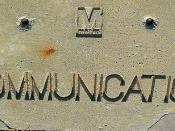Communication in Management:
In The Workplace
Inside and outside the workplace, communications in management exist. If you are breathing, you are a manager because everyone manages their own lives in which we communicate with ourselves about what choices and decisions we should make. Communication is a part of our everyday life that occurs whether we intend to or not. Every individual has a particular style of communicating. These styles include both verbal and non-verbal approaches, except in unfortunate circumstances where a person is literally incapable of verbally communicating. With so many styles of communication and several different personalities, it is easy to have discrepancies and misunderstandings that result in communication. These products of poor communication create tension and hostility that could result in severed relationships and uncompleted goals. Poor communication can be fatal to the success of a business or organization. "Good communication ensures individuals know what is expected of them and ensures coordination within the organization" (Ball).
"At the root of a large number of organizational problems is poor communication. Effective communication is an essential component of organizational success" (Wertheim). For these reasons, it is crucial for a manager to possess both effective verbal and non-verbal communication skills with his or her employees.
"Every time we open our mouths to speak, we are taking a leap of faith--faith that what we say will be understood by our listeners more or less as we mean it" (Tannen). When verbally communicating with an employee, a manager should always be clear and precise in relaying tasks and assignments, in giving guidelines, and in giving feedback on an employee's performance.
To be effective in verbal communication, a manager must first be aware of communication barriers before approaching an employee. Communication barriers are disadvantages of verbally communicating, such as noise, hearsay, and a choice...



Thanks
This was a nice essay thanks for the insight.
0 out of 0 people found this comment useful.